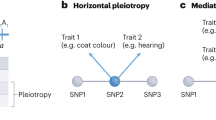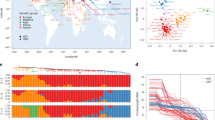Abstract
SEX in the Diptera is determined by a variety of genetic mechanisms ranging from the simple condition of male or female heterogamety to complex polygenic systems1. Studies of tsetse flies have shown the males of all species examined to be heterogametic XY with a heteropycnotic Y chromosome2,3. Such cytological heterogamety is found in many dipteran species but the presence of ‘sex’ chromosomes does not necessarily mean that they are involved in sex determination4. Although there have been no studies specifically related to sex determination in Glossina, it has been postulated that the system is similar to that found in Drosophila5. I report here on a natural population of Glossina palpalis palpalis (R-D) found to contain a high incidence of aneuploids, the composition of which may be used to explain the mechanism of sex determination in the genus.
This is a preview of subscription content, access via your institution
Access options
Subscribe to this journal
Receive 51 print issues and online access
$199.00 per year
only $3.90 per issue
Buy this article
- Purchase on Springer Link
- Instant access to full article PDF
Prices may be subject to local taxes which are calculated during checkout
Similar content being viewed by others
References
White, M. J. D. Animal Cytology and Evolution, 3rd edn (Cambridge University Press, London, 1973).
Southern, D. I. & Pell, P. E. Chromosoma 44, 319–334 (1973).
Davies, E. D. G. & Southern, D. I. Genetica 46, 413–418 (1976).
Bridges, C. B. Genetics 1, 1–52 (1916).
Curtis, C. F. et al. Genet. Res. 21, 153–165 (1973).
Evans, E. P., Burtonshaw, M. D. & Ford, C. E. Stain Technol. 47, 229–234 (1972).
Bridges, C. B. Am. Nat. 59, 127–137 (1925).
Meyer, G. F. Z. Zellforsch. mikrosk. Anat. 84, 141–175 (1968).
Jordan, A. M., Trewern, M. A., Southern, D. I., Pell, P. E. & Davies, E. D. G. Bull. ent. Res. 67, 35–48 (1977).
Zimmering, S. in The Genetics and Biology of Drosophila (eds Ashburner, M. & Novitski, E.) 569–613 (Academic, London, 1976).
Nash, T. A. M. in The African Trypanosomiases (ed Mulligan, H. W.) 602–613 (Allen & Unwin, London, 1970).
Craig, G. B., Hickey, W. A. & VandeHey, R. C. Science 132, 1887–1889 (1960).
Milani, R. International Atomic Energy Agency Publication, 381–397 (STI/PUB/265 Vienna, 1971).
Bull, J. J. & Charnov, E. L. Heredity 39, 1–4 (1977).
Dame, D. A. & Schmidt, C. H. Bull. ent. Soc. Am. 16, 24–30 (1970).
Author information
Authors and Affiliations
Rights and permissions
About this article
Cite this article
MAUDLIN, I. Chromosome polymorphism and sex determination in a wild population of tsetse. Nature 277, 300–301 (1979). https://doi.org/10.1038/277300a0
Received:
Accepted:
Issue Date:
DOI: https://doi.org/10.1038/277300a0
This article is cited by
-
Amplified fragment length polymorphism (AFLP) analysis of closely related wild and captive tsetse fly (Glossina morsitans morsitans) populations
Parasites & Vectors (2010)
-
The distribution of repetitive DNAs between regular and supernumerary chromosomes in Species of Glossina (Tsetse): a two-step process in the origin of supernumeraries
Chromosoma (1981)
Comments
By submitting a comment you agree to abide by our Terms and Community Guidelines. If you find something abusive or that does not comply with our terms or guidelines please flag it as inappropriate.



